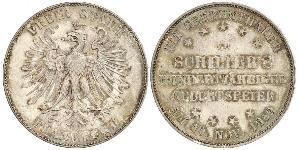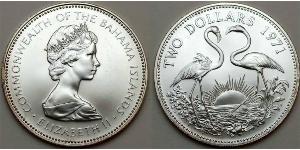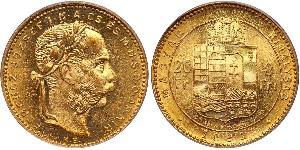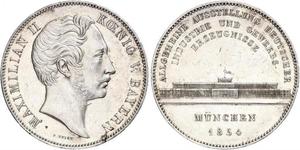(sold for $72.0)
1897, Prussia. Medallic "German Empire 25th Anniversary " Silver Thaler Coin. Rare!
Mint Year: 1896 Condition: A nice lustre AU+ Reference: Rudolph 559, KM-. Rare! Denomination: Medallic Commemorative Thaler ("Gedächtnisthaler" = Memory Thaler) Weight: 16.84gm Diameter: 33mm Material: Silver
Obverse: Three medallions showing Wilhelm I (above), Busmarck (left) and Moltkes (right) on olive-wreath. Iron cross with date (1870) below.
Reverse: Inscription in six lines above anniversary dates (1871-1896). Legend: DIESER GEDÄCHTNISSTHALER WURDE z. FEIER D. 25 JÄHRIGEN WIEDERBEGRÜNDUNG D. DEUTSCHEN REICHES GEPRÄGT 1871-1896 Translated. "This memory thaler was struck to commemorate the 25th anniversary of the re-establishing of the German Empire, 1871-1896"
The German Empire (German: Deutsches Kaiserreich, officially Deutsches Reich) was the historical German nation state that existed from the unification of Germany in 1871 to the abdication of Kaiser Wilhelm II in 1918, when Germany became a federal republic.
The German Empire consisted of 26 constituent territories, with most being ruled by royal families. This included four kingdoms, six grand duchies, five duchies (six before 1876), seven principalities, three free Hanseatic cities, and one imperial territory. Although Prussia became one of several kingdoms in the new realm, it contained most of its population and territory, thus remaining a powerhouse with a major say in imperial affairs. Its influence also helped define modern German culture.
After 1850, the states of Germany had rapidly become industrialized, with particular strengths in coal, iron (and later steel), chemicals, and railways. In 1871, it had a population of 41 million people, and by 1913, this had increased to 68 million. A heavily rural collection of states in 1815, now united Germany became predominantly urban. During its 47 years of existence, the German Empire operated as an industrial, technological, and scientific giant, gaining more Nobel Prizes in science than any other country.
Germany became a great power, boasting a rapidly growing rail network, the world's strongest army, and a fast-growing industrial base. In less than a decade, its navy became second only to Britain's Royal Navy. After the removal of Chancellor Otto von Bismarck by Wilhelm II, the Empire embarked on a bellicose new course that ultimately led to World War I. When the great crisis of 1914 arrived, the German Empire had two allies, Italy and the Austro-Hungarian Empire; Italy, however, left the alliance once the First World War started in August 1914.
In the First World War, German plans to capture Paris quickly in autumn 1914 failed, and the war on the Western Front became a stalemate. The Allied naval blockade caused severe shortages of food. Germany was repeatedly forced to send troops to bolster Austria and Turkey on other fronts. However, Germany had great success on the Eastern Front; it occupied large Eastern territories following the Treaty of Brest-Litovsk. German declaration of unrestricted submarine warfare in early 1917 was designed to strangle the British; it failed, because of the use of a trans-Atlantic convoy system. But the declaration—along with the Zimmermann Telegram—did bring the United States into the war. Meanwhile, German civilians and soldiers had become war-weary and radicalised by the Russian Revolution.
The high command under Paul von Hindenburg and Erich Ludendorff increasingly controlled the country, as they gambled on one last offensive in spring 1918 before the Americans could arrive in force, using large numbers of troops, aeroplanes and artillery withdrawn from the Eastern Front. This failed, and by October the armies were in retreat, Austria-Hungary and the Ottoman Empire had collapsed, Bulgaria had surrendered and the German people had lost faith in their political system. After at first attempting to retain control, causing massive uprisings, the Empire collapsed in the November 1918 Revolution with the Emperor and all the ruling monarchs abdicating. This left a republic to manage a devastated and unsatisfied populace.
Wilhelm I, also known as Wilhelm the Great (William Frederick Louis, German: Wilhelm Friedrich Ludwig) (March 22, 1797 - March 9, 1888) of the House of Hohenzollern was the King of Prussia (January 2, 1861 - 9 March, 1888) and the first German Emperor (18 January 1871 - 9 March, 1888). Under the leadership of Wilhelm and his prime minister Otto von Bismarck, Prussia achieved the unification of Germany and the establishment of the German Empire.
On January 2, 1861 Frederick William died and Wilhelm ascended the throne as Wilhelm I of Prussia. He inherited a conflict between Frederick William and the liberal parliament. He was considered a politically neutral person as he intervened less in politics than his brother. William nevertheless found a conservative solution for the conflict: he appointed Otto von Bismarck to the office of Prime Minister. According to the Prussian constitution, the Prime Minister was responsible solely to the king, not to parliament. Bismarck liked to see his work relationship with Wilhelm as that of a vassal to his feudal superior. Nonetheless it was Bismarck who effectively directed the politics, interior as well as foreign; on several occasions he gained Wilhelm's assent by threatening to resign.
In the aftermath of the Franco-Prussian War Wilhelm was proclaimed German Emperor on January 18, 1871 in Versailles Palace. The title "German Emperor" was carefully chosen by Bismarck after discussion until (and after) the day of the proclamation. Wilhelm accepted this title grudgingly as he would have preferred "Emperor of Germany" which, however, was unacceptable to the federated monarchs, and would also have signalled a claim to lands outside of his reign (Austria, Switzerland, Luxemburg etc.). The title "Emperor of the Germans", as proposed in 1848, was ruled out as he considered himself chosen "by the grace of God", not by the people as in a democratic republic. By this ceremony, the North German Confederation (1867-1871) was transformed into the German Empire ("Kaiserreich", 1871-1918). This Empire was a federal state; the emperor was head of state and president (primus inter pares - first among equals) of the federated monarchs (the kings of Bavaria, Württemberg, Saxony, the grand dukes of Baden, Mecklenburg, Hesse, as well as other principalities, duchies and the senates of the free cities of Hamburg, Lübeck and Bremen). On May 11, 1878, Max Hödel failed in an assassination attempt on Wilhelm in Berlin. A second attempt was made on June 2, 1878, by the anarchist Karl Nobiling, who wounded Wilhelm before committing suicide. These attempts became the pretext for the institution of the Anti-Socialist Law, which was introduced by Bismarck's government with the support of a majority in the Reichstag in October 18, 1878, for the purpose of fighting the socialist and working-class movement. The laws deprived the Social Democratic Party of Germany of its legal status; they prohibited all organizations, workers' mass organizations and the socialist and workers' press, decreed confiscation of socialist literature, and subjected Social-Democrats to reprisals. The laws were extended every 2-3 years. Despite this policy of reprisals the Social Democratic Party increased its influence among the masses. Under pressure of the mass working-class movement the laws were repealed on October 1, 1890. In his memoirs, Bismarck describes Wilhelm as an old-fashioned, courteous, infallibly polite gentleman and a genuine Prussian officer, whose good common sense was occasionally undermined by "female influences".

|
Posted by:
anonymous 2017-06-13 |
1 Histamenon Byzantine Empire (330-1453) Gold Michael VII Do ...
group has 6 coins / 4 prices
⇑
10 Corona Austria-Hungary (1867-1918) Gold Franz Joseph I (1 ...
group has 11 coins / 9 prices
⇑















-300-150-MXzBwcI0KsgAAAEmEfE6TOhH.jpg)

-300-150-SKcKbzbiJ5YAAAFGklQOlaMu.jpg)






